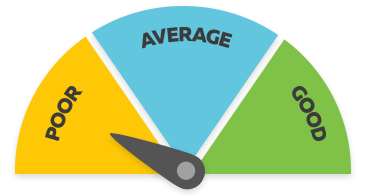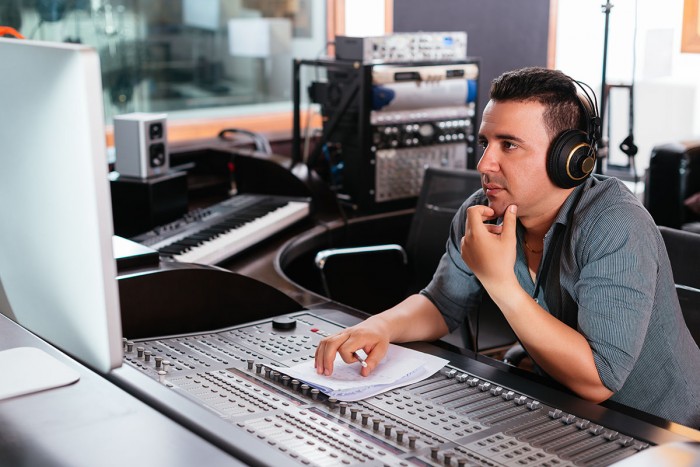Sound Technician
Kaihangarau Oro
Alternative titles for this job
Sound technicians operate and maintain the equipment used to record, mix and amplify sound for radio, film, television, music and events.
Pay
Sound technicians usually earn
$49K-$80K per year
Source: Gravity Events, The Inside Track, Native Audio, 2018.
Job opportunities
Pay
Pay for sound technicians varies depending on skills, experience and the type of work they do.
-
Entry-level or assistant sound technicians usually earn minimum wage or above.
-
Experienced sound technicians usually earn between $30 and $80 an hour.
-
Sound technicians on a salary usually earn between $49,000 and $80,000 a year.
Many sound technicians are self-employed and work on short-term contracts.
Sources: Gravity Events; The Inside Track; Native Audio, 2018.
(This information is a guide only. Find out more about the sources of our pay information)
What you will do
Sound technicians may do some or all of the following:
- discuss requirements with clients
- prepare recording booths and television studios for recording
- choose and set up equipment such as microphones
- preview sound recordings and adjust quality to correct level
- mix sounds on a mixing desk, and add sound effects
- mix sound for live bands and corporate events
- creatively use sound to support the story in film and television productions
- edit recordings and adjust sound levels as necessary
- set up and pack out sound equipment
- maintain sound equipment.
Skills and knowledge
Sound technicians need to have:
- knowledge of sound, music and acoustics
- technical skills to operate sound recording equipment and sound production and editing software.
Working conditions
Sound technicians:
- may work long and irregular hours, including evenings, weekends and public holidays
- may work indoors in radio, film and television studios, recording rooms and concert venues, or outdoors in various locations.
What's the job really like?

Andrew Downes
Recording Engineer
Andrew Downes never planned on becoming a recording engineer, but 30 years after he “fell into” the job he can’t see himself ever doing anything else.
Doesn’t feel like a job
“I don’t really see being a recording engineer as a job, I think that’s what I enjoy most about it. I’ve managed to find something that if I wasn’t doing for a living, I’m pretty sure I’d be doing as a hobby.”
No such thing as a typical day
“There’s no such thing as a typical day for me. I might be editing sound files, or mixing audio, or I might have to travel somewhere for a recording session. I tend to spend a large amount of time soldering and fixing broken equipment as well.
“I also spend a bunch of time watching videos to get new skills on how to use new versions of software or finding out about new hardware and similar things. So I count that as being an important part of my work.”
It’s important to be self-motivated, patient and persistent
“You have to be very self-motivated and patient because, like any career in the arts, there’s a lot of rejection. You’ve got to be persistent.”
Sound technician video
David O'Brien talks about life as a sound technician – 2.42 mins.
I deal with all the live sound aspects of a concert.
Day-to-day would be putting up speakers and using mixing consoles to turn artists' instruments and voices up and down at a show; make things sound good at concerts. So this is a mixing console.
I'm getting ready for a Troy Kingi show.
I'll be on the side turning things up and down for him and the rest of his band.
For instance, if Troy needs to hear his guitar louder when he does a solo, I'll select him and turn his guitar up for him.
So you can hear it louder in that, in that particular part, we sort of do this a little bit in advance to make sure we're in the best position, when it comes show day.
One of the most important things is how to coil a cable. You'll do it a lot.
There's a lot of cables. You're under, over, under, over.
And it doesn't ruin the cable and go like a telephone line, all squiggly.
Keep the cables in good condition and packed away nicely. There's a lot of
physical parts, but if you're smart, you can get other people to do it.
I mainly work in the concert side of my job, but it's transferable to multiple things. You've got theatre shows, there's theatre tours, you've got film that even takes on sound engineers.
You've got whatever TV show you can think of that involves sound.
Corporate events. There's a place for everyone, for sure. I've always had a thing for live music. At school, I had friends in bands. I've, I've been in a band and I sort of fell into this by my careers teacher showing me that there's more to concerts than being in the band.
I studied a live sound course, for a year that taught me a lot of the basics, and so that was a year out of high school that got me in the door.
You don't need to do a course. You could show up at the front door tomorrow
and be prepared to, to learn and, and to work hard for a bit, and you'll be able to get where you want to get.
As long as you have an interest in making things happen and following
instructions, then you can get where you need to go. Favorite thing is not being in office
and, you know, face a new challenge each day. Yeah, we work with a bunch of fun people. Really.
Everyone s got a good sense of humor. We all like to work hard.
I think that s how we all ended up here.
It s enjoyable and it s hard work at the same time.
Entry requirements
There are no specific entry requirements to become a sound technician as skills are gained on the job as a sound assistant. However, you usually need:
- a tertiary qualification in a relevant field, such as sound engineering or television, video and film production
- experience and demonstrated ability in sound operation.
Secondary education
There are no specific secondary education requirements to become a sound technician. However, music, dance, and drama, digital technologies, media studies, English and maths are useful.
Personal requirements
Sound technicians need to be:
- patient, reliable and creative
- able to show initiative
- able to work well under pressure
- detail focussed
- able to work to deadlines
- good problem solvers and decision makers
- good communicators and team players
You've got to be patient. While you’re employed by people, you’re also working with them and everybody works at different speeds.

Andrew Downes
Sound Engineer
Useful experience
Useful experience for sound technicians includes:
- any previous recording or sound work
- work with audio production software and equipment
- event work, such as work at festivals and concerts
- work in the music, television or film industry.
Physical requirements
Sound technicians need to have excellent hearing. They also need good stamina as they may have to stand at a sound desk for long hours.
Check out related coursesWhat are the chances of getting a job?
Few opportunities for sound technicians
It is difficult to get paid, full-time work as a sound technician due to the small size of the entertainment industry in New Zealand.
According to the Census, 546 sound technicians worked in New Zealand in 2018.
Types of employers varied
Sound technicians work for a wide range of organisations. They may work at:
- live concerts
- recording studios
- radio studios
- post-production sound editing suites
- television and film sets
- sound or theatre performances
- corporate events and functions.
Sources
- Burt, C, owner/sound designer, The Inside Track, careers.govt.nz interview, April 2018.
- Isaacs, D, managing director, Gravity Events, careers.govt.nz interview, April 2018.
- Junovich, G, managing director, Native Audio, careers.govt.nz interview, April 2018.
- Stats NZ, '2018 Census Data', 2019.
(This information is a guide only. Find out more about the sources of our job opportunities information)
Progression and specialisations
Sound technicians may progress to become production managers or to run their own business.
Sound technicians may specialise in a particular medium such as television, film, radio or music recording. They may also specialise in a particular area, such as live events or post production sound mixing.
Last updated 25 March 2025

